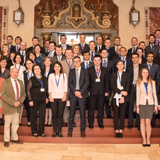
Internationalisation and skills needs are two of the biggest challenges facing SMEs in Eastern Partnership (EaP) countries, the 17th Meeting of the Platform 2 on Economic Convergence with EU Policies heard in Brussels on 18 May 2017.
Platform 2 works to improve economic integration between EaP countries and the EU and help EaP countries align with relevant EU policies to improve their business potential.
Challenges facing SMEs
The 17th Platform 2 Meeting was opened and chaired for the morning session by Eric Mamer, Director of the European Commission’s Directorate-General for the Internal Market, Industry, Entrepreneurship and SMEs (DG GROW).
Mr Mamer took stock of the achievements of EaP countries on both the economic and regulatory front and underlined the remaining challenges:
- access to finance
- regulatory and policy reforms
- low level of innovation
- skills needs for SMEs
- internationalisation (or the ability to take business abroad into new markets).
About 70 representatives of the six EaP countries (Armenia, Azerbaijan, Belarus, Georgia, Moldova and Ukraine) took part in the meeting, along with EU member states (Czech Republic, Estonia, France, Ireland, Latvia, Lithuania, Poland, Romania and Slovakia), business representatives and those from civil society, international organisations and European Institutions and agencies.
A representative from the Organisation for Economic Co-operation and Development presented its recent study on the impact of Small Business Act policies on the performance of local SMEs in the EaP countries.
Focus on the skills gap
The afternoon sessions focused on skills for employability, one of the key challenges identified for Eastern Partner countries. After introductory presentations from Sonia Peressini (DG Employment, Social Affairs and Inclusion), on the New Skills Agenda for Europe, and Arjen Vos (European Training Foundation), on the corresponding situation in the EaP countries, the afternoon was split into two parts: skills anticipation, and skills for enterprise and entrepreneurship, where participants discussed these questions in small groups.
On skills for enterprise and entrepreneurship, a representative from Ukraine outlined the skills dimension of the forthcoming new Ukrainian SME strategy, and a young wine entrepreneur from Georgia shared her experience of developing an agro-business.




